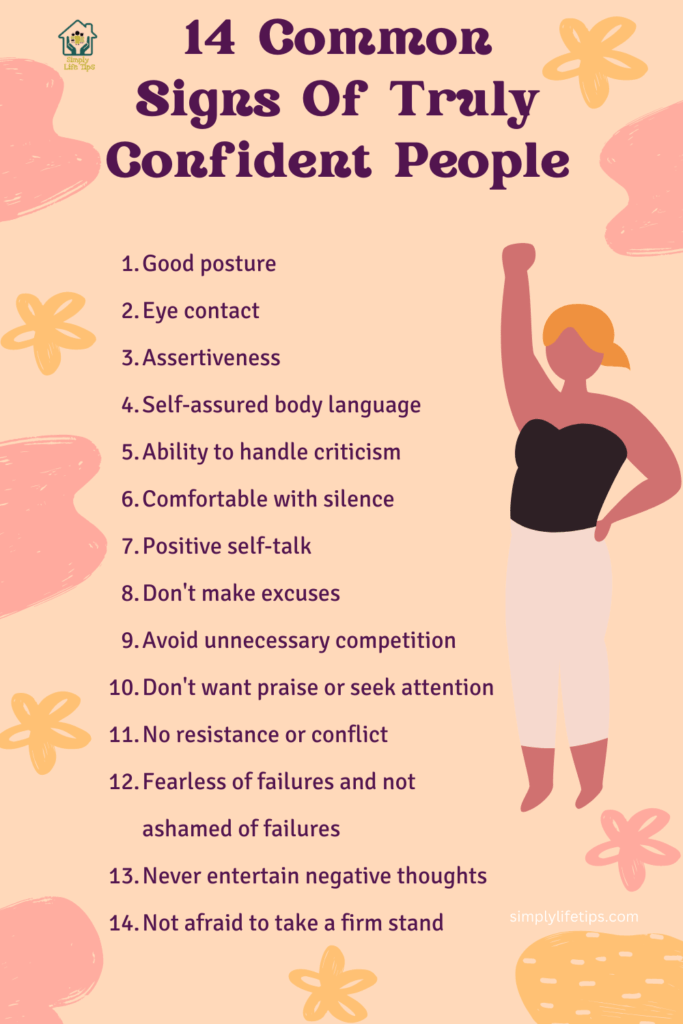There are many common signs of truly confident people. Confidence is a highly valued trait that can play a significant role in one’s personal and professional life. It allows individuals to approach challenges with a positive mindset and belief in their own abilities. But what exactly is confidence, and how can one tell if someone is truly confident? While confidence can be subjective and vary from person to person, there are certain common signs that can indicate a high level of confidence. From good posture and eye contact to a positive outlook and comfort with silence, these traits can help to build a picture of a truly confident individual. Understanding these signs can be a useful tool for developing greater confidence in oneself and for recognizing confidence in others. In this article, let us discuss a few common signs of truly confident people and try to improve our confidence level.
Common Signs Of Truly Confident People
Confidence plays a critical role in achieving success in life. In today’s world, having confidence can be just as important as having skills. Unfortunately, many individuals are held back due to a lack of confidence. How can one recognize confidence in others? What are the indications of individuals who exude confidence? Here are 14 common signs of truly confident people.
Here are 14 Common Signs Of Truly Confident People
- Good posture
- Eye contact
- Assertiveness
- Self-assured body language
- Ability to handle criticism
- Comfortable with silence
- Positive self-talk
- Don’t make excuses
- Avoid unnecessary competition
- Don’t want praise or seek attention
- No resistance or conflict
- Fearless of failures and not ashamed of failures
- Never entertain negative thoughts
- Not afraid to take a firm stand
Here’s a more detailed explanation of each of the common signs of truly confident people:
1. Good posture
Confident individuals stand tall and walk with a sense of purpose. They project an air of authority and are not afraid to take up space. Good posture also helps boost self-confidence by improving breathing and reducing tension. Read How To Sound More Confident Even If You Are Not Confident?
Good posture refers to the alignment of the body in a balanced and comfortable position, with minimal stress on the bones, joints, and muscles. It involves aligning the head, neck, shoulders, back, hips, knees, and feet in a way that places the least amount of strain on the body and helps maintain a stable, symmetrical, and upright position. Good posture can improve balance, stability, breathing, and overall health, and can reduce the risk of injury and strain.

2. Eye contact
Confident people make and maintain eye contact during conversation. This shows that they are engaged and interested in the conversation, and are not afraid to show their confidence through their gaze.
Read Never Stop Believing In Yourself Even For A Second
Eye contact is the act of looking directly into someone’s eyes while communicating. It is a form of nonverbal communication that can convey confidence, interest, engagement, and attentiveness. In many cultures, making eye contact is also considered a sign of respect and trustworthiness. Good eye contact helps establish a connection and can enhance the effectiveness of communication while avoiding eye contact or constantly breaking it can signal disinterest, discomfort, or dishonesty. However, it is important to respect cultural differences and personal preferences, as what is considered good eye contact can vary across cultures and individuals.

3. Assertiveness
Confident people are able to assert themselves in a calm and respectful manner. They are not afraid to voice their opinions, but also listen to others and respect their thoughts. They are able to handle confrontation without becoming defensive.
Assertiveness is a communication style that involves expressing one’s thoughts, feelings, and needs in a confident and direct manner, while also respecting the rights and opinions of others. It allows individuals to stand up for themselves and their beliefs, and to communicate effectively and positively in both personal and professional situations.
Assertiveness involves clearly expressing one’s own boundaries and opinions, while also being open to hearing and considering the perspectives of others. It is a valuable skill for building strong relationships, resolving conflicts, and achieving goals. On the other hand, being too passive or too aggressive can lead to ineffective communication and negative outcomes. Striving for assertiveness helps individuals to communicate effectively and assert their rights and needs in a respectful and responsible way.
4. Self-assured body language
Confident people move with grace and ease, indicating a sense of control and comfort in their own skin. They do not fidget or seem uncertain in their movements.
Self-assured body language refers to the nonverbal cues that convey confidence, power, and control. It can include standing tall, maintaining an open and relaxed posture, making eye contact, using a clear and steady voice, and moving deliberately and purposefully. Smiling, nodding, and maintaining good eye contact can also convey interest and engagement.
Self-assured body language can help individuals project confidence and command respect, making them more persuasive and effective in their interactions with others. On the other hand, nervous or unsure body language, such as fidgeting, avoiding eye contact, and slouching, can undermine confidence and credibility. Paying attention to and improving one’s body language can help to communicate effectively and project self-assuredness in various situations.
Read the 5 body language secrets to become confident in any situation.
5. Ability to handle criticism
Confident individuals are able to take criticism in stride, viewing it as an opportunity for growth rather than a personal attack. They do not take negative feedback to heart and instead use it to improve themselves.
The ability to handle criticism refers to one’s capacity to receive and respond to negative feedback or evaluations in a constructive manner. It involves being open to feedback, recognizing that criticism can be an opportunity for growth and improvement, and managing one’s emotions in response to criticism.
Being able to handle criticism effectively requires a growth mindset and the ability to separate criticism from one’s sense of self. It also involves being able to effectively communicate and negotiate to find mutually beneficial solutions, rather than becoming defensive or attacking in response to criticism. Developing this skill can help individuals to maintain positive relationships, learn and grow from feedback, and become more resilient and successful in both personal and professional contexts.
6. Comfortable with silence
Confident individuals are comfortable with pauses or silences in conversation and do not feel the need to fill the void with mindless chatter. They understand that silence can be a powerful tool for communication and can demonstrate confidence and control.
Being comfortable with silence means feeling at ease with pauses or periods of quiet in conversation or interaction. It involves being able to tolerate the absence of sound and not feeling the need to constantly fill the void with talk. Being comfortable with silence can demonstrate confidence, composure, and respect for others. It can also allow individuals to reflect, listen, and think before speaking, leading to more meaningful and effective communication.
On the other hand, feeling uncomfortable with silence can lead to nervous talking or rambling, which can undermine confidence and detract from the quality of communication. Being comfortable with silence is a valuable skill that can enhance one’s presence and ability to communicate effectively in various situations.

7. Positive self-talk
Confident people have a positive internal dialogue, focusing on their strengths and abilities. They avoid negative self-talk and instead encourage themselves to achieve their goals. This positive outlook helps to build confidence and resilience.
Positive self-talk refers to the internal dialogue or messages that individuals give themselves. It involves speaking to oneself in a positive, encouraging, and supportive manner, rather than engaging in negative or self-defeating thoughts. Positive self-talk can improve one’s confidence, motivation, and overall well-being, and help to cope with stress and adversity. You must avoid negative phrases that affect confidence and positivity. Understand the power of thoughts and unlock the potential of your mind.
Examples of positive self-talk include affirmations, such as “I am capable and competent,” and reframing negative thoughts into positive ones, such as “I can learn from this mistake.” Positive self-talk can help individuals build resilience, maintain a positive outlook, and perform at their best. On the other hand, negative self-talk can lead to feelings of self-doubt, anxiety, and depression, and undermine performance and well-being. Cultivating a positive inner dialogue is an important aspect of emotional intelligence and personal growth. Increase self-confidence to make life awesome.
8. Don’t make excuses
Confident individuals do not make excuses when faced with blame or criticism. They handle instructions calmly and do not become easily upset. They know how to use criticism for personal growth. When given a task or responsibility, they take it seriously and do not neglect their duties. Confident individuals also have the ability to admit their mistakes and are open to receiving suggestions and corrections. They accept feedback graciously and use it as an opportunity to grow and improve. This approach to challenges and responsibilities is a key characteristic of self-confident individuals.
9. Avoid unnecessary competition
Confident individuals are not concerned with competing with others. They are not affected by comparisons and instead, focus on self-improvement. Confident people do not feel the need to dominate or have the upper hand in interactions and relationships. They are secure in themselves and do not derive their self-worth from their relationships with others. This lack of competitiveness and the focus on personal growth are key signs of confidence.
10. Don’t want praise or seek attention
Self-confident individuals do not seek validation from others for their accomplishments. They do not require attention or recognition and are content to celebrate the successes of others. They have a tendency to praise others and acknowledge their achievements, rather than seeking attention for their own. This behaviour is a hallmark of individuals who possess self-assurance.
11. No resistance or conflict
It’s important to keep in mind that confidence can manifest differently in different individuals and that these signs may not always be present in everyone. However, these are common signs of truly confident people and can be a good starting point for developing greater confidence in oneself.
12. Fearless of failures and not ashamed of failures
Confident individuals are not intimidated by failure and do not view it as a source of shame. They have a strong belief in themselves and their abilities and understand that their potential is greater than any individual failure. They face challenges fearless of failures. Confident people embrace failure as an opportunity to learn and grow, and they use their experiences to drive their continued improvement. This positive outlook and resilience are key traits of confident individuals.
13. Never entertain negative thoughts
Confident individuals have a deep understanding of their strengths and abilities. They have a positive self-image and continuously encourage themselves, recognizing the good qualities within themselves. This self-assurance and positive self-talk form the foundation of their confidence, allowing them to approach life with a sense of purpose and direction. This inner belief in oneself is a defining characteristic of confident individuals.
14. Not afraid to take a firm stand
Confident individuals have bold and fearless attitudes. They are not afraid of taking risks and are not deterred by the possibility of failure or criticism. Confident people are results-oriented and focused on achieving their goals. They do not let the fear of losses or blame hold them back and instead, they pursue their objectives with determination and persistence. This bold approach to life is a hallmark of individuals with high levels of confidence.
14 Common Signs Of Truly Confident People

Final Thoughts
In conclusion, confidence is a complex trait that can manifest in many different ways. However, there are common signs that can indicate a high level of confidence, such as good posture, eye contact, assertiveness, self-assured body language, the ability to handle criticism, comfort with silence, and positive self-talk. Understanding these signs can be a valuable tool for developing greater confidence in oneself and for recognizing confidence in others. Confidence can have a significant impact on one’s personal and professional life, and by focusing on these common signs, individuals can work towards building their own confidence and becoming more self-assured. You can check what signs of truly confident people you have.
Do you have signs of truly confident people?
Thank you for your visit.
Don’t forget to share it.
Leave your thoughts in the comment box below.
Chat

Mathukutty P. V. is the founder of Simply Life Tips. He is a Blogger, Content Writer, Influencer, and YouTuber. He is passionate about learning new skills. He is the Director of PokketCFO.
He lives with the notion of “SIMPLE LIVING, CREATIVE THINKING”. He Believes – “Sharing is caring.” and “Learning never ends.”



